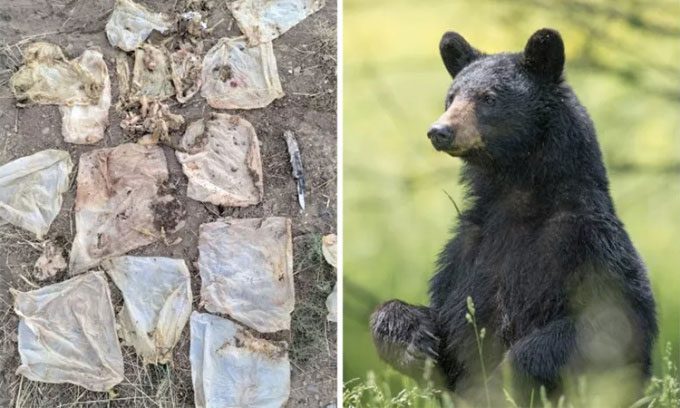Authorities in Colorado had to euthanize (humanely kill) a bear suffering from severe intestinal blockage due to consuming human waste.
“The bear could not digest food and was seriously ill. All of it was from trash, which we have mentioned far too often when discussing bear conflicts in Colorado. The reason we had to euthanize it was to end the suffering caused by ingesting indigestible waste,” Newsweek reported on September 14, quoting Rachel Sralla, a regional manager at the Colorado Parks and Wildlife (CPW).

Wet wipes removed from the bear’s stomach in Colorado (left) and an illustration of a black bear (right). Photo: Wirestock/Getty/Colorado Park and Wildlife
Experts found the bear near a riverside trail in Telluride on September 9. It weighed about 180 kg, exhibited symptoms of fever, had swollen eyes, and was discharging pus from its eyes and mouth. The animal also appeared to be in severe abdominal pain, walking hunched over and struggling to move.
This bear was well known in the area and may have been involved in a home break-in in Colorado during the summer. Previously, it had responded to intimidation techniques, but now it no longer reacted when confronted by experts. According to the U.S. Fish and Wildlife Service, intimidation techniques are employed to deter unwanted behavior in wildlife, such as making loud noises, flashing lights, or spraying water.
“Based on the bear’s behavior and condition, CPW decided to euthanize it for human safety and health reasons, while also preventing the bear from continuing to suffer,” CPW stated. During the autopsy, experts were shocked by what they discovered.
“Examination of the intestines and stomach revealed that the bear was starving due to a blockage caused by paper towels, disinfecting wipes, napkins, pieces of plastic bags, and food wrappers in the pylorus. This blockage was accompanied by potato chips, green beans, onions, and peanuts. The small and large intestines were empty. The intestines were distended due to bacteria in the early stages of decomposition, but we opened several locations and found no digested food,” said Mark Caddy, a manager at CPW.
Colorado is home to approximately 8,000 to 12,000 black bears. They are generally shy and wary of humans, but are attracted to the smell of food and human waste, which can sometimes put them at risk. The incident on September 9 serves as a reminder for residents to ensure their trash bins are secure, safe, and kept away from hungry bears.


















































